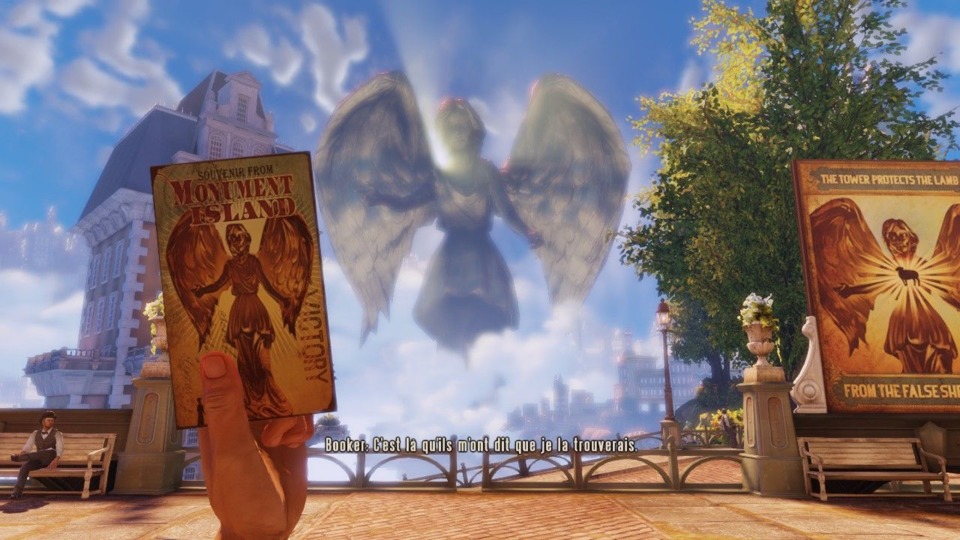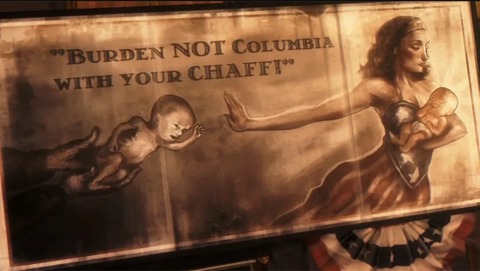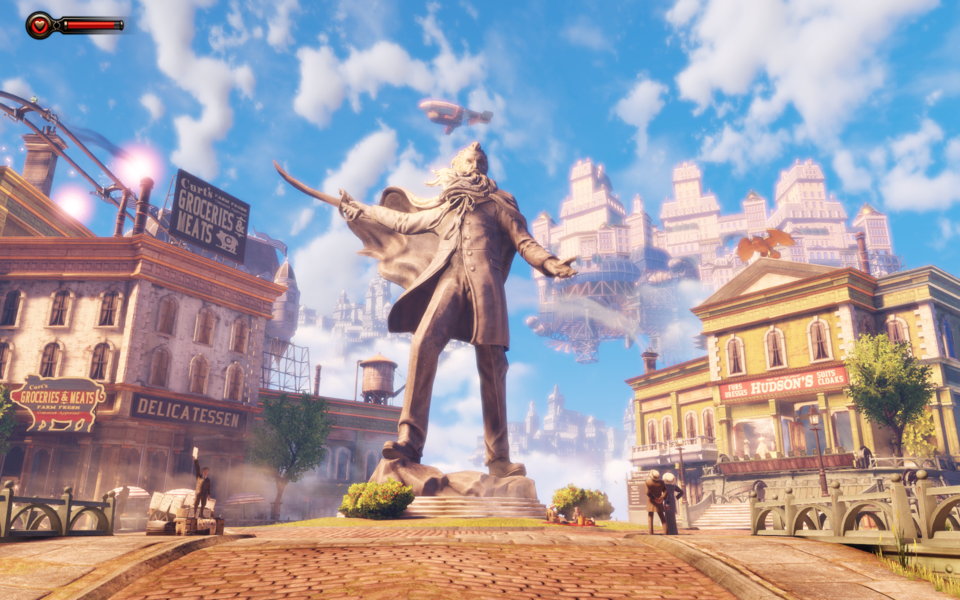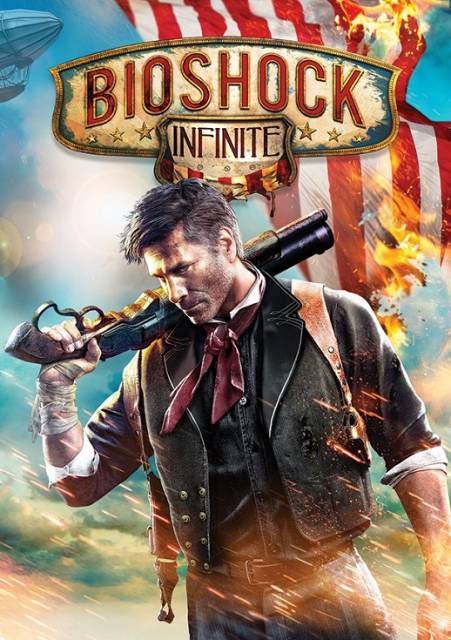Despite its flaws, this game is still an incredible experience.
In March of 2013, I played Bioshock Infinite for the first time. Immediately upon putting my controller down, I felt so strongly about it that I stayed up until 4:30 in the morning writing an EXTREMELY rough around the edges review of it. That was my first review ever and this game is solely responsible for you reading this or any of the other things I’ve written about games since. Somewhere in between the first time I reviewed this game and this, my third review of Bioshock Infinite, I began viewing games in a different way. Picking apart themes and mechanics and how the two intertwine became more of a focus than just writing about how entertaining a game was. So here goes my third, slightly more refined review of Bioshock Infinite.

(SPOILERS AHEAD!!! In order to fully explore my feelings on this game I must go into detail on many of its themes and story beats)
Bioshock Infinite is a game that appears to be about many things, but in reality, is a game about games. Much like Bioshock was a game about whether or not players actually have a choice in games, Bioshock Infinite is a game about whether or not those choices matter in the end. This game explores that theme in many ways, by the limiting the player to two weapons out of a selection of guns that all work well enough to get the job done, by giving the player a few innocuous decisions such as Elizabeth’s brooch, by jumping through timelines that alter the history and future of Columbia, and finally by straight up saying so at the end with “We swim in different oceans, but end up on the same beach”. As much as I’m a proponent of video games using the medium to explore themes, I feel that Bioshock Infinite tries, but ultimately only half succeeds on its attempts. For every choice like the brooch, which ends up being a fairly good way to force the player to at least think of what the symbols actually mean in the end, there is the gear system, which can lead to some cool effects in combat but is ultimately meaningless. For every instance of the game bringing attention to what I call “always something” game design, where games always make you do something unnecessary to just open a door or progress, there is still the fact that the game makes you play through the entire Hall of Heroes sequence, undercutting its own commentary on the subject. That is really my short take on the game. For everything it does well, it does something equally pointless, for lack of a better word. The combat is fast paced and always frantic, but there really is no point in limiting the player to two weapons, especially when all weapons work well in all situations. The skylines add an extra layer to the combat, but they only exist in a handful of encounters. This leads to a feeling that they missed a ton of opportunities with this game. However, the biggest examples of missed opportunities would be the tears. In combat, the tears work to bring in advantages such as cover, health kits, ammo, or even turrets to aid the player. In the narrative however, they seem like a revolutionary idea, but then end up being messy and convoluting a reasonably entertaining story. Then, later on, they just become an ex-machina that the game sort of uses as a crutch anytime it gets written into a corner. Whenever anything needs to be done, Elizabeth just happens to be able to open up a tear that conveniently fixes the issue. As I said, it’s a blatant ex-machina that basically works as a narrative “get out of jail free” card and considerably weakens the story.
I know I said the tears were the most disappointing thing about this game, but I spoke too soon. The single most disappointing thing about Bioshock Infinite is the world of Columbia itself. The floating city in the clouds, filled to the brim with as many symbols of Americana as you could possibly fit in a city, stands as a monument to the ideas of American Exceptionalism. I’ll get into more detail in the next paragraph, but with the world they set up, and all of the themes that are flirted with, the fact that the game boils those lofty concepts down to simple racism=bad and absolute power corrupts absolutely, really leaves a feeling of disappointment, especially when looking at what it could have been.

As I mentioned earlier, Bioshock Infinite sort of brings up some heady themes over the course of its 14 or so hour run time. While the game brings up classism, through the strife between the Founders and the Vox Populi, it never really has much to say about the causes and effects of structural classism, instead choosing to just use classism and racism as a shorthand to denote who the bad guys are. While in the Finkton levels, the game sure has a lot of signage and quotes about labor issues, but never truly explores the true effects of unregulated capitalism. It just sort of says that it’s bad, then sort of pushes it off to the side for a revolution side plot that eventually falls into the “both sides” nonsense that plagues modern political discourse. I think all of the major plot points are where the decisions made with Bioshock Infinite’s world truly get exposed. Rapture, in the original Bioshock, was a commentary on Ayn Rand’s philosophies and the ideas behind objectivism. Rapture in Bioshock 2, made by a different team, at least sort of attempts to be a commentary on some of the core ideas of collectivism. Columbia in Bioshock Infinite at its outset and at points throughout the game flirts with being a commentary on the über-religious, hyper-capitalist, ethnostate that seems to be the end game of all Republican policies, but at the end the game just sort of lightly touches on those ideas and moves on to alternate dimensions and time travel convolutions that really take away from the intrigue of what could have been one of the most fascinating game worlds ever created. All of that being said however, playing this game in the political climate of the United States in 2019 was often times surreal.

Despite me pretty much running it down this whole time, I still deeply enjoy Bioshock Infinite. I’m not one of the people who judge games based on pre-release trailers, so I enjoy the game for what it is. But I am also disappointed with it for the things it seems like it’s going to do, but then ultimately drops in favor of the timeline jumping aspects that, to quote Daisy Fitzroy, “Complicate the narrative”. Despite the disappointment in some of the major aspects, Bioshock Infinite is a game that nails the smaller details. Every detail of Elizabeth’s character bring her to life in a way that I hadn’t seen before and haven’t seen since. The impeccable art style makes Bioshock Infinite one of the most drop dead gorgeous games I've ever seen, even six years and a set of new console hardware later. The game also has some of the most masterful uses of music I’ve ever seen in any medium. While in combat there are unique musical cues for everything, from your shield breaking to being close to death, not to mention maybe the best musical cue I’ve ever heard at the end of every combat encounter. Outside of combat, there are various instances of real-world songs, being re-recorded in a style that fits the time period. Songs like The Beach Boys’s “God Only Knows” being reworked into a barbershop quartet and Creedence Clearwater Revival’s “Fortunate Son” being sung in the style of a slave song are just two of the examples of how this game uses music to great effect throughout its 14 hour run time. Even better still, is that the existence of all of those anachronistic songs in Columbia is fully explained and even plays a role in the greater Bioshock cannon. The last thing I want to mention is the masterful pacing of the game. The combat is quick and frantic, while the time outside of combat is slow and allows for exploration of one of the most gorgeous game worlds in existence. The way the game flows between the two is fantastic and I’ve yet to come across a game that has done it better since.

As Adam Sessler predicted in his immaculate review, this game has been discussed, lionized, utterly despised, and thoroughly broken down many times. There are many people who absolutely hate this game for many understandable reasons. Despite that, I will go on record yet again and finish this review much like the other times I’ve reviewed this game. It may have its flaws, and those flaws may be deep, but Bioshock Infinite is to this day one of my favorite games of all time. There may be an alternate universe where I have changed my opinions on this game, but in this one, I still love this game to pieces. Thanks for reading.
Likes: I enjoy the gameplay, Elizabeth is an amazingly realized character, unparalleled pacing, incredible soundtrack and musical cues that are all used to perfection, Story is as engrossing as any other in the medium, the art style is still just as gorgous as it ever was
Dislikes: Brings up a lot of issues but ultimately doesn't explore them with any real depth, story gets messy once timeline jumps start happening,
